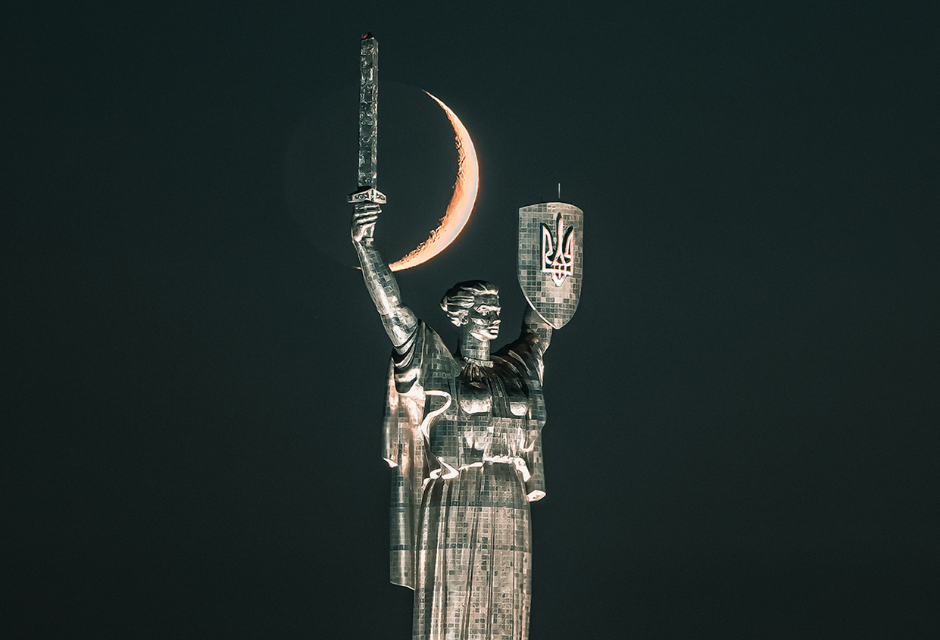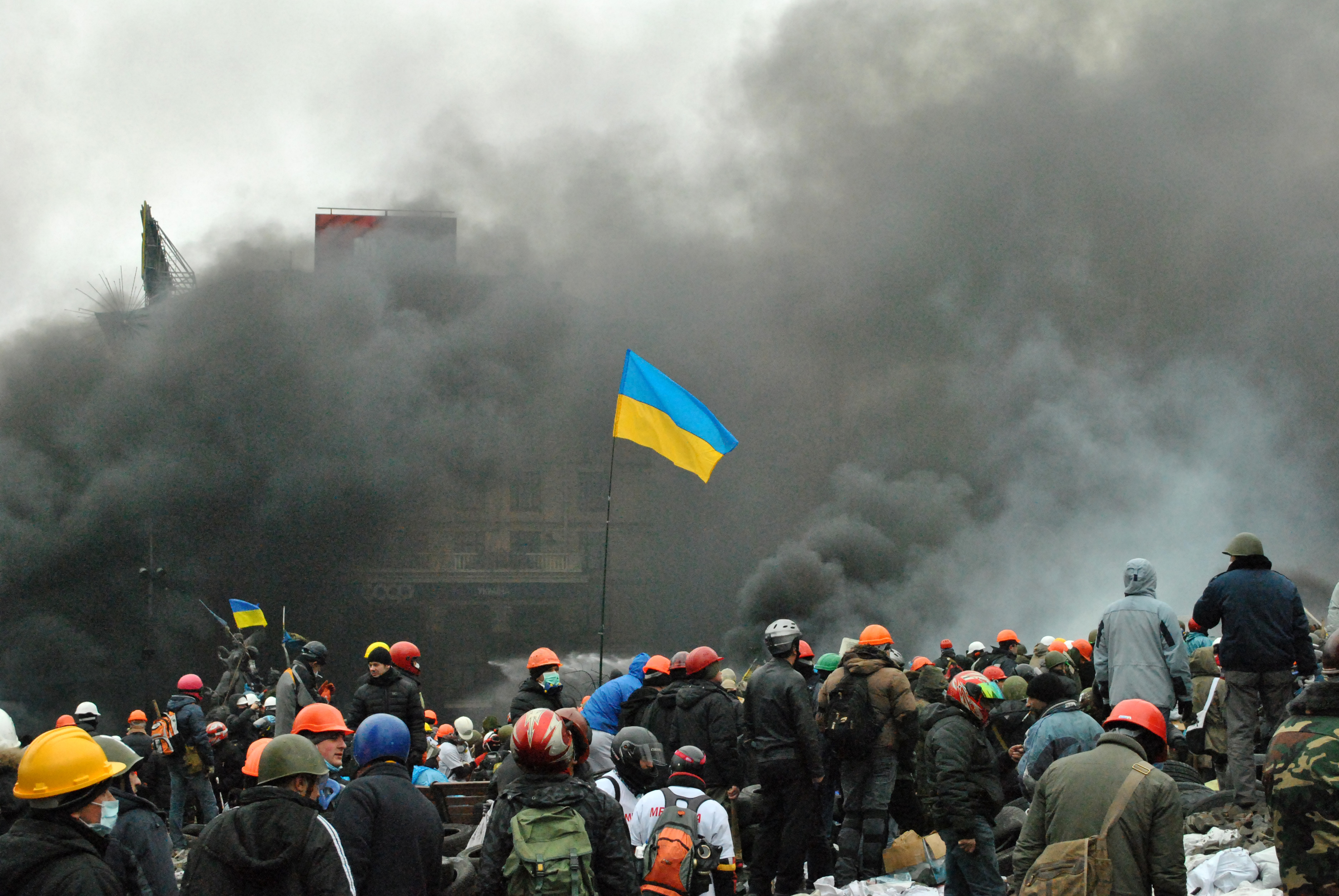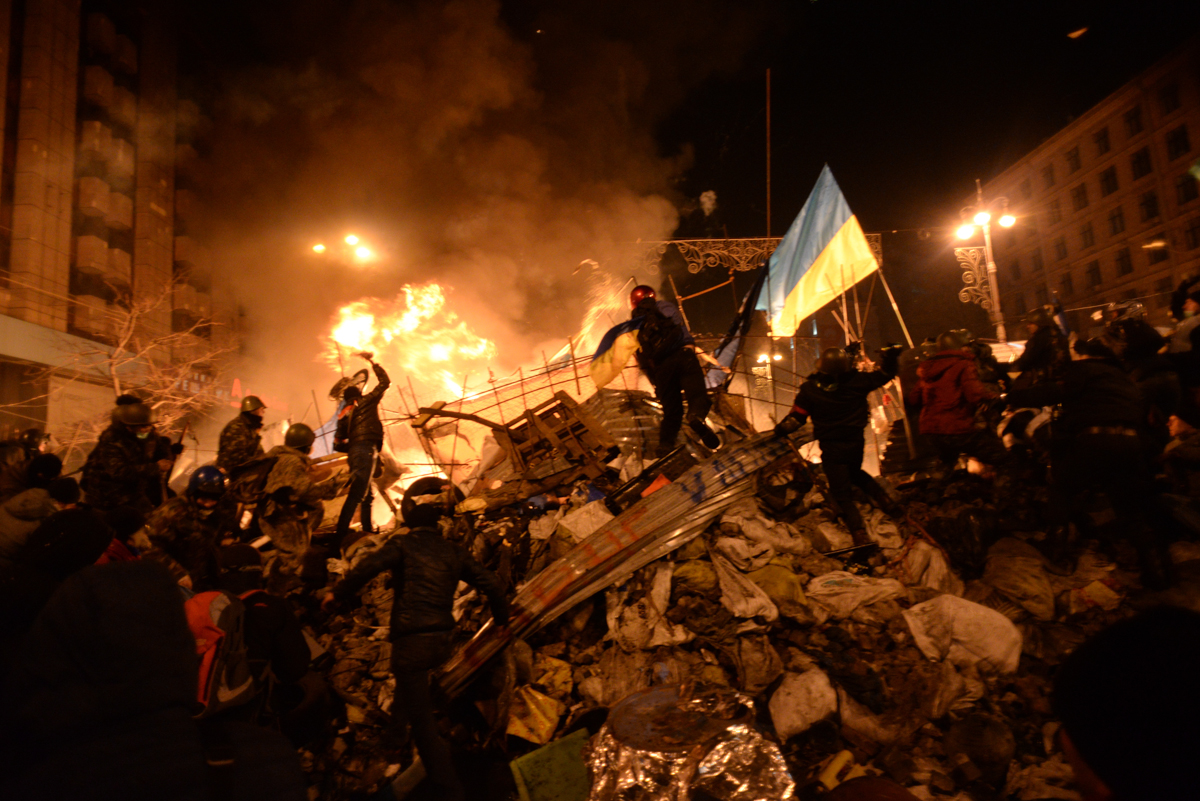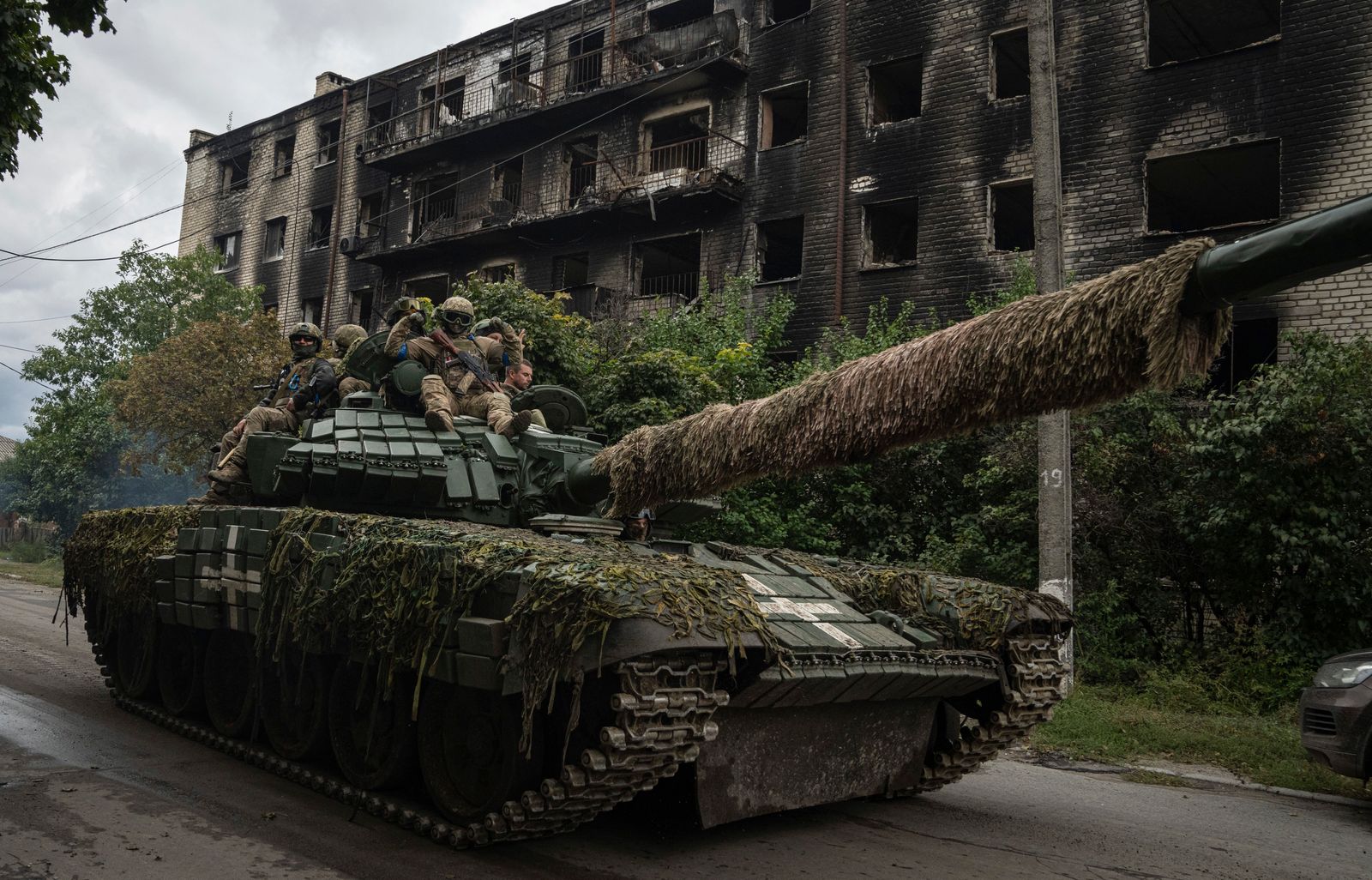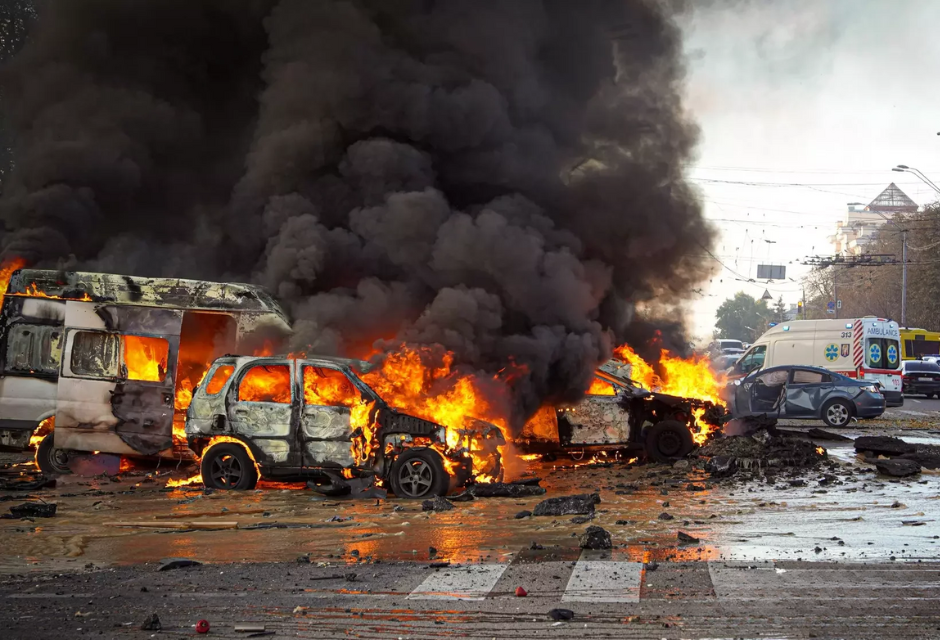Not all history is remembered but every memory has a history. Russia’s horrific war against Ukraine transforms not only history but also the memory of Ukrainians.
If before the year 2014, the main memory events in Ukraine were the Holodomor (starvation enforced by Stalin’s regime during 1932–33) and the Second World War, since 2014 it has been the memory of the Revolution of Dignity (that started in November 2013 and ended in February 2014 with more than a hundred people killed by the police) that has taken the central place in the Ukrainian memoryscape. As a scholar of memory who has been studying Ukraine for more than a decade I have learned a lot about memory due to the war.Historical parallels
When the full-scale invasion started on 24 February 2022, many
Ukrainians drew parallels to the memory of the Second World War. There is even evidence that the older generation
reacted to Russians entering the villages and towns by referring to them as ‘Germans’. It was difficult to find the
correct words to articulate something one could not comprehend. There was simply nothing more terrible in living
memory one could draw parallels to. Memory of the Second World War became the vehicle that helped put what seemed
unspeakable into words. Historian George Liber wrote: ‘The Second World War ignited a monstrous, all-encompassing
inferno, a conflagration without end or mercy.’ Indeed the Second World War that started for many Ukrainians in 1939
with the Soviet occupation in the West, and continued from 1941 with Nazi Occupation of the whole territory, became
the most traumatic period with extensive physical destruction and enormous demographic losses. This allowed
historian Timothy Snyder to speak about Ukraine as the epicentre of what he calls ‘Bloodlands’.
Now Ukrainians are going through yet another ‘all-encompassing’ inferno, a conflagration without end or mercy’
inflicted by Russia intoxicated by its imperialist expansionist ideology, which Timothy Snyder defines as yet
another kind of fascism equipped with the power of social media that circulates ideologies easily and fast. Now
hundreds of thousands of Ukrainian children are being deported to Russia and the people in the occupied territories
suffer unimaginable tortures and hardships. As the death toll of people in Ukraine is not known, people in Ukraine
continue to demonstrate unprecedented courage and perseverance in their resistance.
Considering the losses and the terror of war, it is not surprising that people look for parallels in history to
describe what is happening. Having been studying memory for more than 15 years, I have learned more about memory in
the last two years than in all the previous years. Now I understand better that memory is first and foremost a
cognitive function of our brains and this cognitive function helps us to survive. When Russia encircled Ukrainian
cities, towns and villages, people remembered family stories of survival and resistance transmitted down to them
through many generations who lived and survived before them. These memories gave them strength to act. I also
remember that the moment when I heard that Russia attacked the whole of Ukraine, I immediately thought about my
grandparents who survived the war. That gave me hope that our generation will also survive. Tragically the fact is
that many have not survived and will not survive this war. For me, this is something that is still impossible to
admit. As a historian, I am always very careful with drawing parallels between the past and the present in order not
to overshadow the past. But on a personal level, through the work of memory, parallels do help us. It seems that we
were wired to find solace in our past. Maybe this is the true meaning of the phrase ‘historia magistra vitae’
(history [is] the teacher of life)?
Memory as an imperative
Another thing that I have better understood about memory since the invasion is an imperative to remember. Indeed,
there is a moral need to remember one’s past. I only now fully understand how important remembrance is for society
and what a tragedy it is when memory is banned and remembrance is not possible. Authoritarian regimes are notorious
for doctoring and silencing the past.
The struggle of Ukrainians against authoritarian Russia is also a struggle for the right to remember. In the
Soviet Union there was no memory of the Holocaust, for instance. There was no distinction or nuances in memory of
the victims. People collectively were presented either as winners or as victims. The master narrative of war in the
Soviet Union was mainly the narrative of triumph of victory over Nazism (which in the Soviet Union was referred to
as fascism). There was a lot of misnaming during the Soviet period. The Second World War was known as the Great
Patriotic War and even the chronology was misleading. When I went to school, we read that the war started in 1941,
not in 1939. It was in drastic contrast to the stories I heard from my grandparents. Already as a schoolgirl I
understood that there was a discrepancy between what one read in the schoolbooks and what one heard from family. As
a historian, I know that such discrepancies are common for authoritarian and dictatorial regimes. Democracies help
memories to survive. Moreover, in democracies there are more opportunities to combine what one hears at school and
at home as many smaller stories find their way into a bigger official narrative. Autocracies and dictatorships work
in a different way, they create histories where many people cannot recognise themselves. The gap between lived
experience and what one reads in textbooks is big and sometimes insurmountable.
With the fall of the Soviet Union the situation changed. German scholar Aleida Assmann writes that after the
fall of the Berlin Wall, Europe faced three different processes regarding memory. In Western Europe, its societies
tried to address memories of perpetrators and victims in the remembrance of the Holocaust and crimes of the Nazi
regime. In Eastern Europe, societies focused on their memories as victims of the crimes of a Communist regime.
Finally in Russia, society succumbed to nostalgia for the lost greatness that later consolidated to legitimise
aggression against neighbouring states. True, even in Russia, at the beginning of the 1990s, under Boris Yeltsyn
there was a slight move towards the reconceptualization of memory. The best example of this direction was the
recognition by Russia of Katyn massacre when 22,000 Polish military officers and intellectuals were executed by
Soviet secret police. Yet even these shifts did not involve Russia’s re-evaluation of its imperialist legacies.
Russia’s war against Ichkeria (or better known as Russia’s Chechen Wars) only proved that Russia continued to hold
its territories with force. With Putin’s coming to power in 2000 even the slightest shifts in reinterpretation of
Soviet history were stopped on the state level and the country moved back to the Soviet narratives of triumph
without reflecting on the price of this triumph. Stalin got rehabilitated as a ‘skilled manager’. The memory culture
regarding the Second World War is often called the Victory frenzy (pobedobesie, which in Russian combines a
meaning of victory and diabolical obsession).
This culture is mainly based on the cult of violence. In 2014, when Russia annexed Crimea and started the war in
Donbas, Victory Day was celebrated with the phrase ‘We can repeat it’, which is a direct opposite to the ethics of
the Western memory of war reflected in the slogan ’never again’. Moreover, Russian memory culture bears strong
masculine and patriarchal connotations. During the celebrations of Victory Day, one can see slogans such as ‘On
Berlin!’ or ‘On German women’ – a direct connotation to notorious mass rapes by the Soviet Army. When crimes are not
punished, they are repeated. War atrocities inflicted by Russia in Georgia, Syria and Ukraine show it all too well.
Researchers of memory call the West European approach to remembering the Second World War as a ‘memory of regret’.
Russia did not regret and continued to fall into the Great Victory frenzy year after year.
It is a big problem that Russia cannot cope with its past. Crimes against humanity committed by the Communist
regime were never recognised by the Russian regime. To say the truth, they were never fully recognised by non-East
European societies either. The English historian Tony Judt wrote that after the war, we all pretended that we had
peace and ignored that half of Europe was actually under the occupation of the Soviet regime. Ukrainian writer
Oksana Zabuzhko described the fall of the Soviet Union as a ‘semi-collapse’ of the empire because even after
acquiring independence many former republics were still under the influence of Russia. Ukraine’s attempts to keep
this influence resulted in the Revolution of Dignity and later in Russia’s attack on Ukraine.
Empires seldom give up their expansionist ambitions without bloodshed. Russia is what the German historian
Dietmar Rothermund calls a ‘post-imperial nation’ that shows all the symptoms of ‘post-imperial malaise’: lack of
acceptance of reality, painful experience of the loss of imagined ‘greatness’ that results in an injured feeling of
pride and a nostalgic relationship with the past. This post-imperial identity allows Russians to see themselves as
victims even in relation to Ukraine, ignoring the fact that it is Russians themselves who are the cause of suffering
and that it is Russia that is committing the crimes. Before 2014 I could not imagine the power of such nostalgic
memory and how it can justify the most horrible crimes committed by Russia. The outcome of the war will define
Ukraine’s and Europe’s future. The outcome will also define who and how they will be remembered after the war. I
hope that Ukraine will win and democracy will prevail, and we will have a chance for a complex and inclusive memory:
a memory of Ukrainian resistance and European solidarity that stood against imperialism and won.
